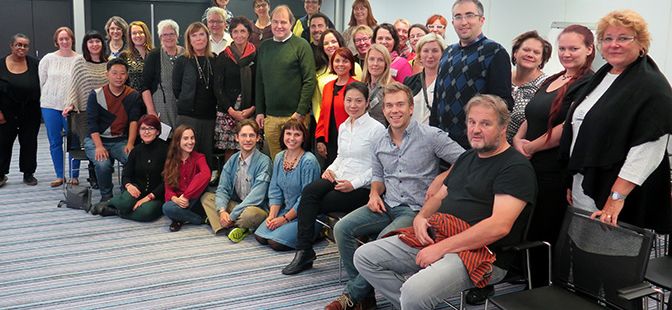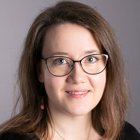
Networking and internationalisation at home
The sixth international conference week of part-time education and Master’s degrees was organised on TUAS’ Ruiskatu campus on 21–25 September 2015. The participants came from the United States, China and several European countries.
Of the 24 lecturers, some have participated in every international week and some a couple of times. There were also a lot of first-timers. Their number has increased year by year.
The keynote speakers of the conference were Barbara McLean from Atlanta and Paul Beenen from the Netherlands. The lecturers included multiprofessional experts; for example doctors, nurses, social workers, psychologists and physiotherapists.
The week’s programme featured expert lectures, planning of expert exchanges and looking for partner networks. A seminar organised on a cruise ship focused on networking in terms of research and development activities and brainstorming new project topics. Something concrete was also achieved in the seminar.
“The starting point of the international week has been students’ internationalisation at home, and strengthening their language skills and cultural awareness”, says Head of Education and Research Pia Ahonen.
“A second starting point has been planning teacher exchanges and the networking of teachers. The week provides excellent opportunities for this and I hope that our staff and students seize the opportunity", Ahonen continues.
Efforts yield results
The arrangements of an international conference week take a lot of work and time. The preparations were started at the end of February by sending the first messages. The invitations were sent out to the teachers’ own contacts, coordinators and project partners. Enrolments and cancellations were submitted until the start of the conference week.
“The international week was organised already for the sixth time, so partly the arrangements were routine. However, there are differences between the cultures and their ways of working”, says Raija Sairanen, who took care of the practical arrangements.
The programme was honed right up until the beginning of the week. The themes followed the Master’s programmes within Health Care and Well-being. The last abstracts arrived during the week and invoicing was handled in many different ways.
“The atmosphere was great however. During the week, working together and community-orientation were emphasised. The participants were motivational, creative and inspirational”, say the pleased coordinators Sairanen and Hanna Peussa.
“Our team of speakers was truly multiprofessional and they had invested in their presentations. Each presentation gave me some ideas”, Sairanen says.
A small mistake can be fateful
Text: Päivi Myllymäki
Doctors and nurses visiting an Ebola patient in their protective gear… The striking image brings news photos and movies to mind. Specialist in clinical nursing and especially intensive care Barbara McLean, who visited the international week, described her everyday life in the division of critical care at the Grady Hospital in Atlanta, USA.
“In acute situations such as serious epidemics and disasters there is always chaos, but it has to be minimised by management, communications and refined models of operation, which have been trained. Being prepared for the arrival of contagious diseases.
Whether it is about the consequences of a natural disaster or SARS, the essential thing is to work as a team and not focus on professional titles or education. Everyone must work well together and the actions must be based on good preparations and internal communications. The experts in emergency care, intensive care, anaesthesia and care constantly train and plan for real-life situations.
In a critical situation, a nursing unit and isolation unit must be established quickly and everyone's personal safety must be taken care of. Work is done under a lot of pressure and every mistake may be fateful and lead to a patient’s or employee’s death. The work is not for everyone.
However, starting a special team became necessary only when serious diseases became global. It is unfortunate to say this but it was only when the first Americans caught diseases like Ebola that we noticed the need to prepare for critical situations", Barbara says.
An American nurse is brave
Grady Hospital is a public hospital of 1,100 patient beds. It is open for everyone but cooperates with the private Emory University.
Barbara McLean emphasises the responsibility for treating everyone. The national health reform of the USA is a good start in the country where six million inhabitants have had no health insurance. However, the start is not good enough. There’s still a lot to be developed.
“The role of a nurse in the USA is very autonomous, especially in intensive care, where medical science and nursing are seamlessly connected. The nurses don't hesitate to express themselves and even question the doctors' solutions if they happen to disagree. The nurse is by the patient’s bedside and speaks for the patient.”
Barbara McLean is an inspiring advocate for nursing. She travels around the world to train people in the field. Originally from New York, she has started to feel at home in Georgia and the slower rhythm of the Deep South. In her spare time, Barbara relaxes by spending time with her family, doing sports and reading crime novels.
Barbara also entertains herself by watching hospital series, even though doctors such as House are inconceivable to the woman who works in a large metropolis hospital.
“From time to time, the real-life clinical reality leaves something to be desired. Encountering patients more respectfully and communicating instead of patronising would often be in order.
A good nurse can combine evidence-based science and nursing into a seamless entity. Neither of these should be lost in the training or work”, Barbara McLean emphasises.
Get to know these:
Barbara McLean
Grady Hospital
Shifting the focus from illness to health
Text: Niina Katajapuu
Paul Beenen is a charming sports physiotherapist and health scientist from Hanze University of Applied Sciences, Groningen in the Netherlands. His message was clear.
“We health care professionals should change the way we approach our work. We should give up the focus on illness and live health as an active and positive matter in our everyday lives.”
Paul has worked as a physiotherapist in a psycho-geriatric retirement home.
“I felt very strongly that by working together with the resident, their next of kin and a multiprofessional team we could make the resident's life much nicer.”
Paul Beenen has also worked with overweight children. They used an approach which included the child and their parents, the school, health care and the decision-makers whose responsibility was to influence in the constructed environment where these children lived.
What does Paul Beenen want to take home to the Netherlands from TUAS’ international week?
“Definitely your slogan Excellence in action! It crystallises several things that are important to me. You should be proud of your strategy and truly start living it instead of just talking about it. Turku must be the most smiling city in Finland, the people are open and kind”, he says.
With the help of his two inspiring lectures, Paul hopes that he left us feeling somewhat uncomfortable so that we will start to change our ways of working on the health aspect more dramatically.
“It is positive that we are going to work together with different professionals and ordinary people more to find creative solutions to the challenges of staying healthy.”
